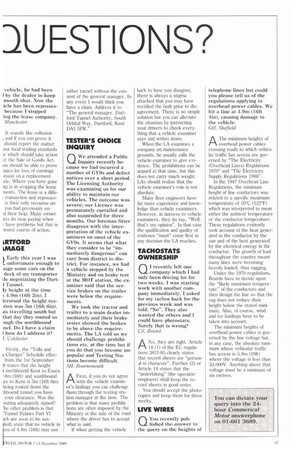TESTER'S CHOICE INQUIRY
Page 45

If you've noticed an error in this article please click here to report it so we can fix it.
QWe attended a Public Inquiry recently because we had incurred a number of GV9s and defect notices over a short period. The Licensing Authority was examining us for our ability to maintain our vehicles. The outcome was severe; our Licence was prematurely curtailed and also suspended for three months. Our foreman fitter disagrees with the interpretation of the vehicle examiners on most of the GV9s. It seems that what they consider to be "immediately dangerous" can vary from district to district. For instance, we had a vehicle stopped by the Ministry and on brake test at the MOT station, the examiner said that the service brakes on the trailer were below the requirements.
We took the tractor and trailer to a main dealer immediately and their brake tester showed the brakes to be above the requirements. The LA told us we should challenge prohibitions etc, at the time but if you do that you become unpopular and Testing Stations become difficult. SH, Bournemouth AFirst, if you do not agree with the vehicle examiner's findings you can challenge them through the testing station manager at the time. The problem is that many prohibitions are often imposed by the Ministry at the side of the road where the driver has to accept what is said.
If when getting the vehicle back to base you disagree, there is always a stigma attached that you may have rectified the fault prior to disagreement. There is no simple solution but you can alleviate the situation by instructing your drivers to check everything that a vehicle examiner says and writes down.
When the LA examines a company on maintenance grounds, he usually calls the vehicle examiner to give evidence. The prohibitions can be argued at that time, but this does not carry much weight. LAs should realise that the vehicle examiner's role is not absolute.
Many fleet engineers have far more experience and knowledge than vehicle examiners. However, in fairness to vehicle examiners, they do say, "Well, that's my opinion". In that case the qualification and quality of evidence "must" come first in any decision the LA reaches.




















































































































































